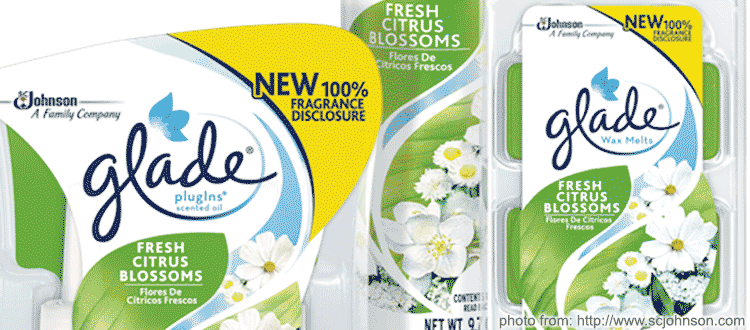Is SC Johnson Really Committed to Transparency?
 |
|
Beth Conway |
Did you hear? SC Johnson announced this week it is disclosing all fragrance ingredients – down to the component level — in a new 3-product collection, the Glade® Fresh Citrus Blossoms. It says so right on the package: “100% fragrance disclosure”. Clearly SCJ knows this is an issue consumers care about. And my, oh my, how far we’ve come. Less than a decade ago, virtually no cleaning product companies were disclosing any ingredients on a website or label. Now to have a major cleaning product company using the prime real estate of its packaging to call attention to full fragrance disclosure? Well, this is something to celebrate.
But as SCJ continues to market itself as a company committed to transparency, I have some questions about the inconsistencies between their actions and their rhetoric.
Why is SCJ limiting 100% fragrance disclosure to a single product collection?
SCJ is limiting full fragrance disclosure to a single line of only three new products, without any mention of extending this policy company-wide to its established and most popular product lines. To promote this new product, SCJ states on their website:
“[W]e think transparency is important. We understand that some people may have concerns about certain ingredients, and we want to make information available so they can make the right choices for their families.”
Hear! Hear! But then why isn’t SCJ providing this level of disclosure for all its products? Consumers don’t want to deal with the hassle of remembering which brand, of which product, of which company, provides access to the information they need to find safer products. And they shouldn’t have to.
Why did SCJ oppose The Cleaning Product Right to Know Act?
SCJ’s announcement also comes just two weeks after the bill AB 708 failed to pass the California Assembly. The bill, titled The Cleaning Product Right to Know Act, requires all cleaning product manufacturers to disclose ingredients used in their products, including all fragrance components. SC Johnson opposed the bill.
Over 80% of consumers express the desire for full ingredient disclosure, so although AB 708 didn’t pass we know it’s only a matter of time before companies are required to give consumers this information. Why would SCJ oppose legislation that could make ingredient disclosure a reality for the whole industry?
Why all the secrecy behind GreenlistTM?
SCJ often holds their chemical safety screening – called GreenlistTM — as evidence of product safety, but the company won’t tell the public the criteria they use to determine whether a chemical is safe enough to be used in its products. This doesn’t seem very transparent to me. What’s more, we know SCJ still uses synthetic musks, chemicals linked to breast cancer. Which makes me wonder: how can hormone-disrupting chemicals like those be considered “safe”?
In 2014 — because of tens-of-thousands of concerned consumers raising their voices — SC Johnson became the first mainstream company to commit to disclosing fragrance chemicals on a product-specific basis. SC Johnson has also started listing ingredients on product labels, and you have eliminated several chemicals of concern to women’s health. We applaud SCJ for taking these steps.
But when there continue to be inconsistencies between their actions and words I have to ask: Is this limited full fragrance disclosure merely a distraction to push a new product or is this an honest example of SCJ’s commitment to transparency?



